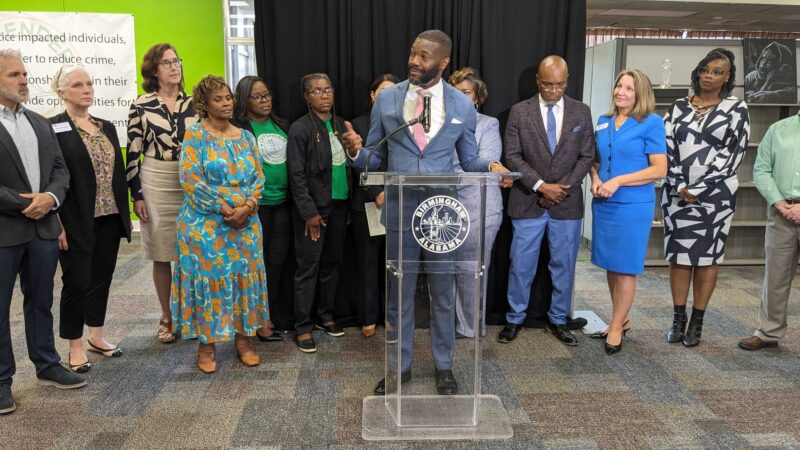In Birmingham, Debate Over Confederate Monuments Renewed After Charlottesville
First heard on NPR’s All Things Considered 8-17-2017
President Trump this week weighed in on the long-simmering debate over Confederate monuments. The president tweeted that he’s sad to see the history and culture of “…our great country being ripped apart with the removal of our beautiful statues and monuments.” He went on to say you can’t change history but you can learn from it.
That debate is playing out this week in Birmingham. Following the bloody white supremacist rally in Charlottesville, Virginia, Mayor William Bell decided to cover up one of the city’s Confederate monuments.
Earlier this year, the Alabama Legislature passed a law preventing any local government from removing, relocating or altering any historical monument. This came after a wave of southern cities began to take down Confederate statues following the racially-motivated killings at a Charleston, South Carolina church in 2015.
Birmingham has long wrestled with how to portray its past. In the 1950s and 60s, some of the bloodiest events of the Civil Rights era happened here. Mayor Bell ordered a Civil War monument to be covered up.
“It’s a monument to segregation. It’s a monument to human bondage. It’s a monument to sedition and the breakup of the United States of America,” Bell says.
The base of the memorial is now wrapped by a plywood barrier to hide the inscription honoring Confederate soldiers and sailors.
Birmingham resident Mark Davis was sitting next to the memorial in Linn Park. He says it should have been removed a long time ago — in a respectful way.
“It seems like people wanted to take offense at the whole heritage thing, but I think this is a whole different question now,” he says.
LaJoya Sanders and Tonya Jackson were strolling by. They say race is complicated in the South.
“We don’t see no color and people look at us like we’re crazy because I’m white and she’s black and we’re walking together,” Jackson says.
“We can’t move forward as a community, state, city, United States, nothing because of racism,” Sanders adds. “They keep trying to hold us back in the past. But they saying, ‘let’s move on’ Why hold on to the past then?”
“Can’t live in the future — living in the past,” Jackson says.
But this week, Alabama Attorney General Steve Marshall sued the city of Birmingham for covering up the Civil War monument. Speaking to reporters this week, he said it’s not about living in the future, or the the past. It’s that the mayor broke the law.
“This has nothing to do with the Confederacy, nothing to do with the long-term history of this particular monument itself,” Marshall says.
The private group ‘United Daughters of the Confederacy’ paid for the monument in 1905. Mayor Bell says he’d like to see the monument moved to a museum where it can be displayed with perspective and context.
“But not give it a place of prominence as something for us to be proud of, or waving over someone’s head that oh, we wish the good old days were here when people of my race were subjugated to Jim Crow laws,” he says.
Bell says this statue has no place in a public park, especially for a city whose majority population is African-American. The mayor welcomes the lawsuit and says it should be up to the city — not the state — to decide how to honor and remember its racial past.
New pilot program will offer housing, resources to people leaving prison
The Birmingham Reentry Alliance will provide wrap around services to dozens of men and women adjusting to life after prison.
A New Orleans garden paid hundreds of dollars in fees for a sewer that doesn’t exist
Galvez Garden owner Lissie Stewart has been fighting the New Orleans Sewerage and Water Board over inaccurate billing for years.
Alabama coal mine keeps digging after hundreds of fines and a fatal explosion
Following the death of a grandfather, Crimson Oak Grove Resources has left a community afraid for their homes and lives. An expert warns one resident may need to evacuate her home while she still can.
Florida’s 6-week abortion ban will have a ‘snowball effect’ on residents across the South
Abortion rights advocates say the ban will likely force many to travel farther for abortion care and endure pregnancy and childbirth against their will.
Attitudes among Alabama lawmakers softening on Medicaid expansion
Alabama is one of ten states which has not expanded Medicaid. Republican leaders have pushed back against the idea for years.
Birmingham is 3rd worst in the Southeast for ozone pollution, new report says
The American Lung Association's "State of the Air" report shows some metro areas in the Gulf States continue to have poor air quality.







